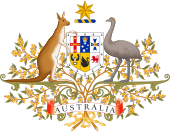The Quarantine Act 1908 (Cth) was an Act of the Parliament of Australia which is no longer in effect. It was assented to on 30 March 1908. It was superseded by the Biosecurity Act 2015 and repealed on 16 June 2016.[1]
| Quarantine Act 1908 | |
|---|---|
 | |
| Parliament of Australia | |
| |
| Citation | No. 3 of 1908 or No. 3, 1908 as amended |
| Territorial extent | States and territories of Australia |
| Royal assent | 30 March 1908[1] |
| Repealed by | |
| Biosecurity Act 2015 | |
| Summary | |
| The Quarantine Act of 1908 was the primary biosecurity and quarantine legislation of the Australian Commonwealth that has been repealed and replaced. | |
| Status: Repealed | |
History edit
Australia imported livestock from several countries with livestock diseases in the 18th century and by the late 19th century, quarantine measure were implemented by the Australian colonies. Clause 51(ix) of the Australian Constitution empowered the federal government to make laws in relation to quarantine. In 1906, the state premiers agreed that the administration of quarantine be transferred to the Commonwealth Government and thus, two years later, the federal parliament enacted the Act, which provided a national approach to quarantine for the first time.[2]
When the Act was passed, sea travel was the only way that people and goods could reach Australia, and the main concern was protecting the country from outbreaks of "quarantinable disease", such as the bubonic plague, yellow fever, smallpox, cholera and leprosy. The Act was amended more than 50 times in its 108 years of existence, as biosecurity risks in Australia changed over time, and the broader concept of biosecurity came to include "protection of the economy, environment and human health from negative impacts associated with entry, establishment or spread of exotic pests and diseases"; a more proactive approach. A number of reviews were undertaken, including the Nairn Report,[3] and then 2008 Beale Review,[4][5] a "comprehensive and independent review of Australia’s quarantine and biosecurity arrangements", which recommended new biosecurity legislation to replace the Quarantine Act.[6]
The Act edit
The Act at its last revision (Compilation No. 44, June 2016) provided for:[7]
- Power to supersede quarantine measures under State Acts, "Whenever the Governor-General is satisfied that an emergency exists which makes it necessary to do so... And may at any time revoke or vary such proclamation". (Chapter 2A)
- The Governor-General to declare the existence of an epidemic. (Chapter 2B)
- The Governor-General to give authorisation to various people or agencies to coordinate a response to the epidemic. (Chapter 3)
It also specified the scope of "quarantine" and defined various terms used in the Act; administration arrangements, including arrangements with states and territories; the relationship with the Environment Protection and Biodiversity Conservation Act 1999 and the Environment Minister; general provisions; quarantining of vessels, persons, goods, animals and plants; monitoring and control; powers for enforcement of the Act, and a number of miscellaneous matters.[citation needed]
Repeal and replacement edit
In 2015, the Biosecurity Act 2015 replaced most of the Act,[8] which was wholly repealed on 16 June 2016 by the Biosecurity (Consequential Amendments and Transitional Provisions) Act 2015.[1][9][10] The new Act was a major reform of the Quarantine Act, in particular in its strengthening and modernising the biosecurity legislation in Australia.[6] New requirements included how the then Department of Agriculture and Water Resources would manage biosecurity risks associated with goods, people and vessels entering Australia.[11]
References edit
- ^ a b c d "Quarantine Act 1908". Federal Register of Legislation. Australian Government. May 2016. Retrieved 23 March 2020.
- ^ "Significant events in the history of NAQs". Department of Agriculture. Retrieved 2 April 2020.
- ^ Durant, S.; Faunce, T (April 2018). "Analysis of Australia's New Biosecurity Legislation [Abstract]". Journal of Law and Medicine. 25 (3): 647–654. PMID 29978659.
- ^ Beal, Roger. "The Beale Review of Biosecurity". Issues Magazine. Retrieved 2 April 2020.
...an edited version of Chapter 1 of One Biosecurity: A Working Partnership (the Beale review).
- ^ Beale, Roger; Fairbrother, Jeff; Inglis, Andrew; Trebeck, David; Australia. Department of Agriculture, Fisheries and Forestry; Biosecurity Australia (September 2008), One Biosecurity : a working partnership, Dept. of Agriculture, Fisheries and Forestry, ISBN 978-0-9803714-5-1,
The independent review of Australia's quarantine and biosecurity arrangements report to the Australian Government.
Full text here - ^ a b "The Biosecurity Act 2015 - more than 100 years in the making, a shift to risk-based regulation, and activation of the Regulatory Powers Act". Maddocks. 15 June 2015. Retrieved 2 April 2020.
- ^ "Quarantine Act 1908". Federal Register of Legislation. Australian Government. 8 June 2016. Retrieved 2 April 2020. Text was copied from this source, which is available under a Creative Commons Attribution 4.0 International License.
- ^ McPhee, Sarah (17 March 2020). "Human biosecurity emergency declared in Australia". NewsComAu. Retrieved 23 March 2020.
- ^ "Biosecurity (Consequential Amendments and Transitional Provisions) Act 2015". Federal Register of Legislation. Australian Government. 27 September 2017. Retrieved 23 March 2020.
- ^ "Biosecurity Act 2015". Federal Register of Legislation. Australian Government. 7 March 2019. Retrieved 23 March 2020.
- ^ "Vessel Reporting Requirements and the Biosecurity Act". Australian Government. Department of Agriculture. 16 June 2016. Retrieved 23 March 2020.